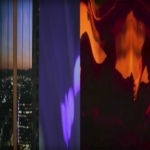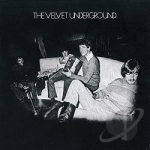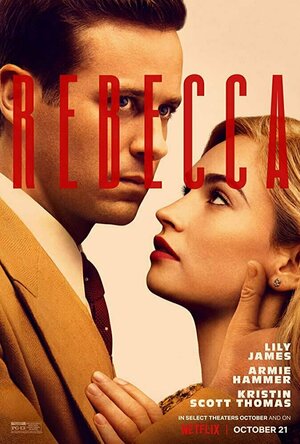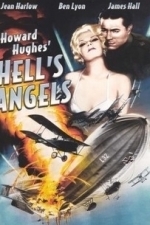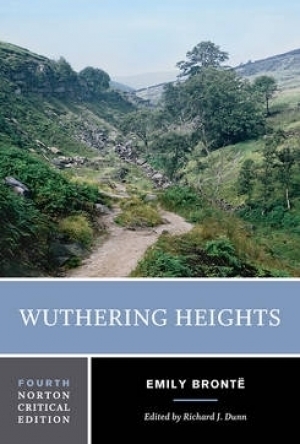Search
Search results
Entertainment Editor (1988 KP) shared own list
Oct 19, 2017

No Home of the Mind by Bing and Ruth
Album Watch
New 2017 album ... now on 4AD! Percussive piano tones 'n' warbling tape delays from the minimal New...
dance electronic
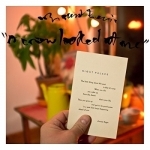
A Crow Looked at Me by Mount Eerie
Album Watch
A Crow Looked at Me is the eighth studio album by Mount Eerie, the solo project of American musician...
alternative rock
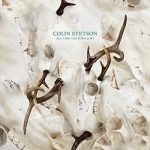
All This I Do for Glory by Colin Stetson
Album Watch
"All this I do for glory" is a reasoning and exploration of the machinations of ambition and legacy,...
alternative rock

Ecce Homo by Felicita
Album Watch
The most surprising aspect of the album Ecce Homo is knowing what enigmatic London-based producer...
experimental instrumental
and 1 other item
Brian Eno recommended Velvet Underground by The Velvet Underground in Music (curated)
Sarah (7800 KP) rated Rebecca (2020) in Movies
Nov 1, 2020
A dull adaptation
Rebecca is an adaptation of Daphne Du Maurier’s 1938 novel of the same name, following a young woman’s whirlwind romance and her battle to rid her new marriage and home of the shadow of her husband’s first wife.
Rebecca as a novel is a classic and a book I very much enjoyed, and whilst I’ve never seen the Hitchcock adaptation, it’s often referred to as a fairly legendary classic too. However I’m afraid to say the same cannot be said about this new version. The basic plot and story is present, although rather frustratingly the ending has been extended unnecessarily, but it has not been executed very well.
The trailer made this look quite sinister and spooky, which is quite right when the original novel is a gothic horror with aspects of a ghost story thrown in. However this film turns out to be nothing of the sort. It’s more of a romantic drama with a hint of thriller thrown in – the gothic horror ghost story is nowhere to be seen and neither is any form of intrigue or suspense. In fact I’d be so bold as to say this is just outright dull, and even the campy over the top sinister vibes from Kristin Scott Thomas’s housekeeper Mrs Danvers are laughable at best. The most interesting part of this was the opening scene with it’s sinister score but this just didn’t carry through to the rest of the film.
Sadly the cast don’t fare very well in this either. Lily James is a great actor, but her version of the new wife is too mousy and timid and you wonder what on earth Maxim ever sees in her. The character herself is very frustrating and irksome as she’s far too naïve and sweet. And Armie Hammer is miscast as Maxim De Winter himself. He looks the part, dashing and handsome, but he’s lacking in the intrigue, charm and secrecy that you’d expect this character to have. He’s also missing the age gap that is rather notable in the book.
The cinematography in this is rather concerning. The scenes in Monte Carlo are far too colourful and garish and they just look out of place, even more so for something that is meant to be a gothic horror. I’m unsure of why this has been done, other than to show a striking difference between Monte Carlo and Maxim’s Cornish home of Manderley. In fact what is most concerning about this film is why Ben Wheatley wanted to direct it. By far the biggest shock of this film was finding out Wheatley, of Kill List and Sightseers fame, had directed it. Wheatley is known for psychological dark (and often funny) thrillers and there is nothing of his style to be seen in this film at all. Which is a shame, as I think a little more of his dark style would’ve propelled this film into more than just a sub-par drama.
Overall this a very disappointing and long winded adaptation of a classic novel. Whilst there are a few decent scenes and a good, if not out of character, performance from Lily James, these are nowhere near enough to save this from being a bit of a bore.
Rebecca as a novel is a classic and a book I very much enjoyed, and whilst I’ve never seen the Hitchcock adaptation, it’s often referred to as a fairly legendary classic too. However I’m afraid to say the same cannot be said about this new version. The basic plot and story is present, although rather frustratingly the ending has been extended unnecessarily, but it has not been executed very well.
The trailer made this look quite sinister and spooky, which is quite right when the original novel is a gothic horror with aspects of a ghost story thrown in. However this film turns out to be nothing of the sort. It’s more of a romantic drama with a hint of thriller thrown in – the gothic horror ghost story is nowhere to be seen and neither is any form of intrigue or suspense. In fact I’d be so bold as to say this is just outright dull, and even the campy over the top sinister vibes from Kristin Scott Thomas’s housekeeper Mrs Danvers are laughable at best. The most interesting part of this was the opening scene with it’s sinister score but this just didn’t carry through to the rest of the film.
Sadly the cast don’t fare very well in this either. Lily James is a great actor, but her version of the new wife is too mousy and timid and you wonder what on earth Maxim ever sees in her. The character herself is very frustrating and irksome as she’s far too naïve and sweet. And Armie Hammer is miscast as Maxim De Winter himself. He looks the part, dashing and handsome, but he’s lacking in the intrigue, charm and secrecy that you’d expect this character to have. He’s also missing the age gap that is rather notable in the book.
The cinematography in this is rather concerning. The scenes in Monte Carlo are far too colourful and garish and they just look out of place, even more so for something that is meant to be a gothic horror. I’m unsure of why this has been done, other than to show a striking difference between Monte Carlo and Maxim’s Cornish home of Manderley. In fact what is most concerning about this film is why Ben Wheatley wanted to direct it. By far the biggest shock of this film was finding out Wheatley, of Kill List and Sightseers fame, had directed it. Wheatley is known for psychological dark (and often funny) thrillers and there is nothing of his style to be seen in this film at all. Which is a shame, as I think a little more of his dark style would’ve propelled this film into more than just a sub-par drama.
Overall this a very disappointing and long winded adaptation of a classic novel. Whilst there are a few decent scenes and a good, if not out of character, performance from Lily James, these are nowhere near enough to save this from being a bit of a bore.
RəX Regent (349 KP) rated Hell's Angels (1930) in Movies
Feb 19, 2019
Big budget, elaborate air combat scenes which resulted in several deaths and Gimmick after gimmick… This has to be the Howard Hughes’ World War 1 epic, Hell’s Angels.
Where to begin?
Well, we follow the Routledge two brothers as they join the war effort and the Royal Air Corps. in 1914 and whilst one is a somewhat cowardly womaniser, his brother is the noble heroic type who spends the film being screwed over bey everyone in one way or another, but most notably by his girlfriend, Jean Harlow, who is so annoyingly wrong for him that it is a relief when he has heart is broken by her in the third act.
But like mots aspects of this plot, this is as messy and disjointed as everything else. We are given a story line to follow for two hours, as Hughes indulges his legendary love of flying to create some of the best dog fight sequences ever committed to film. They are real, epic and effective in conveying the thrilling danger of these world war one battles.
But this is a film of gimmick. Pushing the pre-code envelope with sex and bad language, this was originally conceived as a silent movie and was re-written and re-shot to become the sound movie whcih we have to today and there in clearly lies the problem. What we end up is a movie cobbled together, with silence sequences being converted to sound, the poor acting from its star James Hall as the idealistic Roy Routledge, Jean Harlow, replacing the original silent star Gretta Nissen for this sound version, excelling in her role as his trampy girlfriend and Ben Lyon as the weaker brother, Monte, but the real star of this show are the special effects.
But of the human stars, Harlow, presented here in the only colour footage known to exist of the tragic star, who would die at the young age of 26 just seven years later, probably delivers one of the best performances in the whole picture, certainly outshining her male co-stars.
Of the special effects though, the use of 2-tone Technicolor, which was actually shot with the Metrocolor system but processed by Technicolor, in one sequence as the group are all together at a party, as well as the classical use of tints during some other scenes, add a vibrancy to the project. But this also can have a jarring effect, especially as we leave the colour scenes and wrap up thet sequences in black and white.
But the model effects, notably the munition raid at the end and the Zeppelin bombing London scenes are spectacular, especially for the time. The other notable gimmick which has yet to be transferred to the small screen, was the original use of what was called Magnascope back in 1930.
This was obviously only used at high end theaters but this paved the way for what IMAX are doing now, by blowing up the aerial scenes into a larger screen format from the 1.20:1 ratio which the the rest of film was presented. But when you add all this up you have got a mess!
Magnascope, technicolor scenes, tinted scenes, daring aerial battles, a half arsed love story and an image of world war which was a kin to that of Michael Bay’s Pearl Harbor’s (2001) view of World War 2! But this is what this is. An early, lavish popcorn blockbuster, with little to offer but cinematic thrills, which it succeeds at without any doubt.
The action is great, the plot is mediocre to say the least but as film, it does offer a brief insight into how cinema audiences saw the Great War back in 1930 and you can not help but think that this audience was only nine years away from the next one as we watch this.
pictureBut the ending was grim, with noble ends rounding off a story of brotherly love and love of duty and country, seems overblown considering what we had had to sit through but still, by the end, is anybody really routing for the Routledge brothers to have a happy ending?
I certainly was not. But this ending is the nearest thing that this film has to a story arc, as is pays off the opening act where Roy risks his life fighting a duel for his cowardly brother against the very German officer who is about to have them executed.
Duty wins out and Monte sees the light at the end after a very melodramatic death scene.
But having said all that, this film is worth it for the action alone and for film buffs, the only colour footage of Jean Harlow.
Where to begin?
Well, we follow the Routledge two brothers as they join the war effort and the Royal Air Corps. in 1914 and whilst one is a somewhat cowardly womaniser, his brother is the noble heroic type who spends the film being screwed over bey everyone in one way or another, but most notably by his girlfriend, Jean Harlow, who is so annoyingly wrong for him that it is a relief when he has heart is broken by her in the third act.
But like mots aspects of this plot, this is as messy and disjointed as everything else. We are given a story line to follow for two hours, as Hughes indulges his legendary love of flying to create some of the best dog fight sequences ever committed to film. They are real, epic and effective in conveying the thrilling danger of these world war one battles.
But this is a film of gimmick. Pushing the pre-code envelope with sex and bad language, this was originally conceived as a silent movie and was re-written and re-shot to become the sound movie whcih we have to today and there in clearly lies the problem. What we end up is a movie cobbled together, with silence sequences being converted to sound, the poor acting from its star James Hall as the idealistic Roy Routledge, Jean Harlow, replacing the original silent star Gretta Nissen for this sound version, excelling in her role as his trampy girlfriend and Ben Lyon as the weaker brother, Monte, but the real star of this show are the special effects.
But of the human stars, Harlow, presented here in the only colour footage known to exist of the tragic star, who would die at the young age of 26 just seven years later, probably delivers one of the best performances in the whole picture, certainly outshining her male co-stars.
Of the special effects though, the use of 2-tone Technicolor, which was actually shot with the Metrocolor system but processed by Technicolor, in one sequence as the group are all together at a party, as well as the classical use of tints during some other scenes, add a vibrancy to the project. But this also can have a jarring effect, especially as we leave the colour scenes and wrap up thet sequences in black and white.
But the model effects, notably the munition raid at the end and the Zeppelin bombing London scenes are spectacular, especially for the time. The other notable gimmick which has yet to be transferred to the small screen, was the original use of what was called Magnascope back in 1930.
This was obviously only used at high end theaters but this paved the way for what IMAX are doing now, by blowing up the aerial scenes into a larger screen format from the 1.20:1 ratio which the the rest of film was presented. But when you add all this up you have got a mess!
Magnascope, technicolor scenes, tinted scenes, daring aerial battles, a half arsed love story and an image of world war which was a kin to that of Michael Bay’s Pearl Harbor’s (2001) view of World War 2! But this is what this is. An early, lavish popcorn blockbuster, with little to offer but cinematic thrills, which it succeeds at without any doubt.
The action is great, the plot is mediocre to say the least but as film, it does offer a brief insight into how cinema audiences saw the Great War back in 1930 and you can not help but think that this audience was only nine years away from the next one as we watch this.
pictureBut the ending was grim, with noble ends rounding off a story of brotherly love and love of duty and country, seems overblown considering what we had had to sit through but still, by the end, is anybody really routing for the Routledge brothers to have a happy ending?
I certainly was not. But this ending is the nearest thing that this film has to a story arc, as is pays off the opening act where Roy risks his life fighting a duel for his cowardly brother against the very German officer who is about to have them executed.
Duty wins out and Monte sees the light at the end after a very melodramatic death scene.
But having said all that, this film is worth it for the action alone and for film buffs, the only colour footage of Jean Harlow.
A Bibliophagist (113 KP) rated Wuthering Heights in Books
Feb 12, 2020
Stands up (2 more)
Enthralling
Unique
Dislikable characters (1 more)
Difficult accents without translations
I will do my best to review this, however, I didn't heed the intro, this tour de force really does leave you as quickly as it comes, and reading another book before reviewing this one was a mistake.
In reading reviews prior to reading this book, I learned three major things; 1, people either love or hate this book, 2. I had no idea what I was actually in for, and 3. this may have not been the romantic pick for February I was expecting it to be.
So yes, PSA for anyone out there considering going into this thinking it's a romance. It is NOT. There are love stories in this, absolutely, powerful love stories that made me read quotes to my boyfriend with snarky statements like "if you don't say this at my funeral, did you ever really love me?". But it is NOT a romance. If anything this has more in common with "The Count of Monte Cristo" than it does "Pride and Prejudice". Honestly, the only thing it has in common with other, romantic books of this time, is the time period. But beware, no balls and high society and Mr. Darcy's await you in this novel. I feel a number of the reviews decrying the book, calling the characters "monstrous" both were the orchestrators of their own disappointment by assuming it to be like an Austin, and really need to look in the mirror and reflect on if they are really as perfect as they think they are. Especially if they were in the circumstances that surround this tale.
I find that Heathcliff himself addresses this mistake many readers had going into this book.
"picturing in me a hero of romance, and expecting unlimited indulgences from my chivalrous devotion. I can hardly regard her in the light of a rational creature, so obstinately has she persisted in forming a fabulous notion of my character and actin gon false impressions she cherished."
SO many readers went into this expecting Heathcliff to be some misunderstood brute or one harsh but salvaged by the purity of his love of Catherine. But this isn't the case.
Wuthering Heights tells the story of (I guess technically 3) but really 2 generations of families. Living in the Yorkshire Moors, isolated from high society. We have the Liptons, primmer and properer and more in touch with society, and the Earnshaws which become a little rough around the edges in their isolation and loss. Papa Earnshaw has two children, Catherine and Hindley, and adopts a small boy of unknown heritage but is implied to be Romani or of mixed race (sorry Tom Hardy and nearly every portrayal of Heathcliff), that he names, simply, Heathcliff. He loves Heathcliff, and dotes on him greatly, much to the chagrin of Hindly who grows to resent Heathcliff, treating him terribly until Hindly leaves for school. Catherine and Heathcliff become great playmates, their care is given primarily to a maid scarcely older than them, as Papa Earnshaw is a single daddy. They are wild things, as children I would assume would be, in such isolation as the Yorkshire Moors in a time before the creature comforts and entertainment we have. They grow very close, obsessively close. Upon Papa Earnshaw's death, Hindley returns (at around the age of 23) to run the household, and take over the care of these two youngsters, one of which, he hates. So, Cinderella-style, Heathcliff gets treated worse and worse and treated like a servant rather than the adoptive child that Papa Earnshaw loved so dearly. Suddenly Heathcliff is nothing, treated terribly, and has the most important thing in his life banned from him, Catherine. Meanwhile, the Liptons also have two children, not wild, but spoilt in their own ways, Edgar and Isabella, close in age to Heathcliff and Catherine. When H and C run off on a camping adventure and find themselves at the Lipton's house, Catherine is injured and stays with the Liptons, in their higher society for 5 weeks. Leaving Heathcliff to the abuse of her brother and further isolation. She returns much more a lady and with her connection to Heathcliff slightly burned. In an attempt to protect Heathcliff, and because Heathcliff is now no more than a servant and not an option to marry, Catherine intends to marry Edgar. Causing our resident bad boy to run off for a number of years. Only to return a proper, but still broody gentleman, and confuse Catherine's affection much to the displeasure of Edgar.
Now, this is where a number of shows and movies end things. With a focus on Catherine and Heathcliff's whirlwind romance, obsession. It has some of the most to the point and beautiful lines regarding love, not all flowery, not "I love you most ardently" but rather cries of "I am Heathcliff" by Catherine. Absolutely heart-rending, even though I didn't like Catherine. But this is not where the book ends. The book goes on to follow Heathcliff's obsession with revenge, with his treatment as a child, his rage against Hindley, and against losing Catherine to Edgar. He spends years slowly ruining everyone's lives. Not that you could really ruin Hindley's life, he was a mean drunk. But he even goes as far as to meddle with the next generation, Hindley's son Hareton is raised terribly and is a bit of a wild thing (those his redemption and love story is quite beautiful), Catherine's daughter Cathy and Heathcliff's son Lipton are whisked up into a big scheme by Heathcliff to take everything. Heathcliff even marry's out of pure spite.
Love does not redeem this man, he's barely an antihero without his youth story. He is angry and passionate and obsessed. Which for the first half of the book I didn't fault him for, but he does do some damnable things in the second half that you cannot argue away. No matter how romantic and beautiful and heartrending his lamentations can be. I was quite the character arc, quite the tale of revenge and loss. He was unredeemable because of his big sprawling schemes and harsh intentions. Catherine for me was unredeemable because she was an obnoxious, selfish thing, that honestly if Heathcliff had stopped thinking about two minutes would have found a better woman in every town. She whined and treated Edgar (who was honestly super sweet) so terribly, she had an anger problem and would work herself up until she was sick. But it is in this imperfection that I fell in love more with the book. Here is something unique and real, this is no Elizabeth Bennett. The isolation and hermetic lifestyle created very different characters than what we see in Jane Austin or even in Emily's sister's novel.
It's no wonder this book was harshly critiqued upon release, here is a woman, writing a revenge story, with love stories in it. That based on the biographical intro had some parallels to her own life. She lived an isolated existence, surrounded by the death of the majority of her family young. She was in her late 20s when she wrote this and died a year after publication. She made humans of monsters and monsters of humans and wrote something unexpected and truly unique.
It's hard for me to explain, amongst the harshness and bleakness of this novel, why I loved it so much. But I did, I loved every bit. The anger, the passion, the love, the scheming, I loved it all.
I also feel it's important to note that this whole story is told by a maid to a new tenant. So the narrator is unreliable. Were these people truly this way? Or is it clouded by this maid's opinions of them? How much is omitted due to the maid not being privy to an event?
Truly a fantastic read, that punched me in my chest and gut, grabbed and twisted my insides and refuses to let go. I would argue it's a cult classic rather than a classic. So please, shed all preconceived notions of what this book is, shake that Austin out of your mind and read this tale of obsession and revenge. It's well worth it.
In reading reviews prior to reading this book, I learned three major things; 1, people either love or hate this book, 2. I had no idea what I was actually in for, and 3. this may have not been the romantic pick for February I was expecting it to be.
So yes, PSA for anyone out there considering going into this thinking it's a romance. It is NOT. There are love stories in this, absolutely, powerful love stories that made me read quotes to my boyfriend with snarky statements like "if you don't say this at my funeral, did you ever really love me?". But it is NOT a romance. If anything this has more in common with "The Count of Monte Cristo" than it does "Pride and Prejudice". Honestly, the only thing it has in common with other, romantic books of this time, is the time period. But beware, no balls and high society and Mr. Darcy's await you in this novel. I feel a number of the reviews decrying the book, calling the characters "monstrous" both were the orchestrators of their own disappointment by assuming it to be like an Austin, and really need to look in the mirror and reflect on if they are really as perfect as they think they are. Especially if they were in the circumstances that surround this tale.
I find that Heathcliff himself addresses this mistake many readers had going into this book.
"picturing in me a hero of romance, and expecting unlimited indulgences from my chivalrous devotion. I can hardly regard her in the light of a rational creature, so obstinately has she persisted in forming a fabulous notion of my character and actin gon false impressions she cherished."
SO many readers went into this expecting Heathcliff to be some misunderstood brute or one harsh but salvaged by the purity of his love of Catherine. But this isn't the case.
Wuthering Heights tells the story of (I guess technically 3) but really 2 generations of families. Living in the Yorkshire Moors, isolated from high society. We have the Liptons, primmer and properer and more in touch with society, and the Earnshaws which become a little rough around the edges in their isolation and loss. Papa Earnshaw has two children, Catherine and Hindley, and adopts a small boy of unknown heritage but is implied to be Romani or of mixed race (sorry Tom Hardy and nearly every portrayal of Heathcliff), that he names, simply, Heathcliff. He loves Heathcliff, and dotes on him greatly, much to the chagrin of Hindly who grows to resent Heathcliff, treating him terribly until Hindly leaves for school. Catherine and Heathcliff become great playmates, their care is given primarily to a maid scarcely older than them, as Papa Earnshaw is a single daddy. They are wild things, as children I would assume would be, in such isolation as the Yorkshire Moors in a time before the creature comforts and entertainment we have. They grow very close, obsessively close. Upon Papa Earnshaw's death, Hindley returns (at around the age of 23) to run the household, and take over the care of these two youngsters, one of which, he hates. So, Cinderella-style, Heathcliff gets treated worse and worse and treated like a servant rather than the adoptive child that Papa Earnshaw loved so dearly. Suddenly Heathcliff is nothing, treated terribly, and has the most important thing in his life banned from him, Catherine. Meanwhile, the Liptons also have two children, not wild, but spoilt in their own ways, Edgar and Isabella, close in age to Heathcliff and Catherine. When H and C run off on a camping adventure and find themselves at the Lipton's house, Catherine is injured and stays with the Liptons, in their higher society for 5 weeks. Leaving Heathcliff to the abuse of her brother and further isolation. She returns much more a lady and with her connection to Heathcliff slightly burned. In an attempt to protect Heathcliff, and because Heathcliff is now no more than a servant and not an option to marry, Catherine intends to marry Edgar. Causing our resident bad boy to run off for a number of years. Only to return a proper, but still broody gentleman, and confuse Catherine's affection much to the displeasure of Edgar.
Now, this is where a number of shows and movies end things. With a focus on Catherine and Heathcliff's whirlwind romance, obsession. It has some of the most to the point and beautiful lines regarding love, not all flowery, not "I love you most ardently" but rather cries of "I am Heathcliff" by Catherine. Absolutely heart-rending, even though I didn't like Catherine. But this is not where the book ends. The book goes on to follow Heathcliff's obsession with revenge, with his treatment as a child, his rage against Hindley, and against losing Catherine to Edgar. He spends years slowly ruining everyone's lives. Not that you could really ruin Hindley's life, he was a mean drunk. But he even goes as far as to meddle with the next generation, Hindley's son Hareton is raised terribly and is a bit of a wild thing (those his redemption and love story is quite beautiful), Catherine's daughter Cathy and Heathcliff's son Lipton are whisked up into a big scheme by Heathcliff to take everything. Heathcliff even marry's out of pure spite.
Love does not redeem this man, he's barely an antihero without his youth story. He is angry and passionate and obsessed. Which for the first half of the book I didn't fault him for, but he does do some damnable things in the second half that you cannot argue away. No matter how romantic and beautiful and heartrending his lamentations can be. I was quite the character arc, quite the tale of revenge and loss. He was unredeemable because of his big sprawling schemes and harsh intentions. Catherine for me was unredeemable because she was an obnoxious, selfish thing, that honestly if Heathcliff had stopped thinking about two minutes would have found a better woman in every town. She whined and treated Edgar (who was honestly super sweet) so terribly, she had an anger problem and would work herself up until she was sick. But it is in this imperfection that I fell in love more with the book. Here is something unique and real, this is no Elizabeth Bennett. The isolation and hermetic lifestyle created very different characters than what we see in Jane Austin or even in Emily's sister's novel.
It's no wonder this book was harshly critiqued upon release, here is a woman, writing a revenge story, with love stories in it. That based on the biographical intro had some parallels to her own life. She lived an isolated existence, surrounded by the death of the majority of her family young. She was in her late 20s when she wrote this and died a year after publication. She made humans of monsters and monsters of humans and wrote something unexpected and truly unique.
It's hard for me to explain, amongst the harshness and bleakness of this novel, why I loved it so much. But I did, I loved every bit. The anger, the passion, the love, the scheming, I loved it all.
I also feel it's important to note that this whole story is told by a maid to a new tenant. So the narrator is unreliable. Were these people truly this way? Or is it clouded by this maid's opinions of them? How much is omitted due to the maid not being privy to an event?
Truly a fantastic read, that punched me in my chest and gut, grabbed and twisted my insides and refuses to let go. I would argue it's a cult classic rather than a classic. So please, shed all preconceived notions of what this book is, shake that Austin out of your mind and read this tale of obsession and revenge. It's well worth it.
